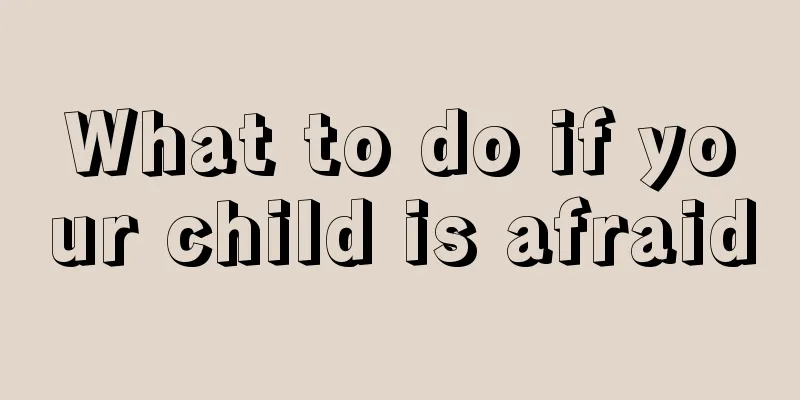What to do if your child is afraid

|
It is normal for children to be timid and easily frightened. The key is not to extend the fear into stronger fear or anxiety when they are afraid. These are situations that parents need to respond to in a timely manner. Children's negative emotions of fear need to be improved in a timely manner, which can effectively prevent the situation from getting worse. The implementation of the method is very important. So, what should we do if the child is afraid? Let’s take a closer look below. 1. Significant changes in physiological routines Especially for very young children, their fear reactions most often manifest in changes in eating and sleeping habits, such as loss of appetite, insomnia, and even bed-wetting. 2. Escape Avoidance is the most direct reaction of a child when he is afraid. When a child encounters people, things, or objects that he is afraid of, he may hide immediately, show a fearful expression on his face, or make evasive movements with his body. 3. Crying When a child is faced with a situation that he cannot avoid and cannot express his fear in words, he will express it by crying. 4. Small movements of anxiety Children with lower reaction intensity may show some subtle movements when they are afraid, such as biting their nails, blinking constantly, fidgeting, clenching their palms, twisting their hands, holding on to someone or something, and being stiff all over. 5. Degenerate behavior When children cannot express their feelings to others, their negative emotions will gradually settle into psychological problems and they may exhibit some regressive behaviors, such as suddenly wetting the bed, sucking on a pacifier, clamoring to be held or asking their mommy to sleep with them, as if they were returning to being a little baby. 6. Disobedience If a normally well-behaved child suddenly becomes disobedient, unreasonable, or even displays aggressive or destructive behavior, it could be a signal that he or she is afraid. Alleviate your child's fear When parents find that their baby is afraid or anxious about something, how should they help the child overcome the fear and become braver? Let the things you fear and like appear together According to the law of classical conditioning, if every time a child sees a dog, he or she remembers the pain of a dog biting him or her and runs away, parents should try to break this conditioned reaction, that is, make sure that the appearance of the dog is accompanied by a pleasant event. For example, when a dog appears, the mother can say to the child in a very happy tone: "What a cute dog! Let's go buy some ice cream and eat it with the dog, okay?", thereby reconditioning the child's reaction to the dog, allowing the child to remember the pleasant experience when seeing the dog. Gradually approach the feared thing Systematically and gradually reduce the child's fear of things, and finally reach the level of no fear at all. For example, a child was originally very afraid of snakes, so scared that he dared not sleep, and even woke up from nightmares. Parents can first provide small, cartoon-like cute snake stickers for the child to play with, and tell the child some interesting stories with snakes as the protagonists. After the child accepts the story, provide larger stickers, followed by pictures, photos, and videos of snakes, and finally take the child to the zoo to see real snakes. This is the so-called systematic desensitization method. Observe and imitate brave children Bandura's social learning theory holds that human behavior is learned by observing and imitating the behavior of others, so a child's fear of things is also caused by observing other people's fear. Therefore, if we can let him observe the brave behavior of other children again, he will no longer be afraid. Share similar fear experiences On the one hand, parents can encourage their children to express what they are afraid of, and listen patiently and explain to them. On the other hand, they can also admit to their children that they have had similar fear experiences, so that the children feel that they are understood by their parents and that they are not the only ones who feel afraid. In this way, they will not feel useless and can begin to build self-confidence. |
<<: What medicine should children take for fever and vomiting?
>>: Why do children often feel dizzy?
Recommend
Why does drinking breast milk cause diarrhea?
Why does drinking breast milk cause diarrhea? If ...
What are the first aid knowledge for primary school students?
In daily life, with the current traffic congestio...
What should I do if my child has pain when urinating?
When your child encounters pain when urinating, y...
Does massage work for infant diarrhea?
Massage is a very common physical therapy method....
Why is the urine white in children?
White urine generally refers to the white color o...
What causes dry cough in newborns? The reason turned out to be this
Newborn babies have very weak immunity and are ea...
What causes chapped lips in children?
When people are young, their immune function is t...
Why do children have red eyes?
Many times, we don’t know why our children sudden...
What should I do if my baby catches a cold and has a runny nose? Parents need to understand these methods
Babies are very easy to catch cold, and the most ...
How to treat hunchback in children?
Hunchback is a very common phenomenon in our live...
What to do if your baby's skin is very dry
In winter, the skin of many babies will become ve...
Is it okay for children to crawl to sleep?
People sleep in many postures. The most common on...
How many days does it take to recover from phimosis surgery in children?
It is a common condition for children to have phi...
Children's massage for fever relief
We all know that when children are sick, parents ...
Newborns must be careful about the dangers of mouth breathing
Many newborns breathe through their mouths, so wh...









